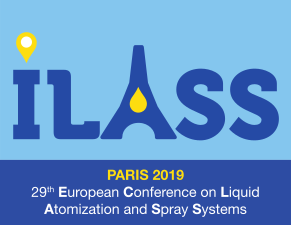Atomization of liquid fuel has a direct impact on the production of pollutant emission in engineering propulsion devices. Due to the multiple challenges in experimental investigations, motivation for numerical study is increasing on liquid-gas interaction from injection till dispersed spray zone. Our purpose is to increase the accuracy of the treatment of droplets in atomized jet, which are typically 100 times smaller than the characteristic injection length size. As the characteristic length reduces downstream to the jet, it is increasingly challenging to track the interface of the droplets accurately. To solve this multiscale issue, a coupled tracking Eulerian-Lagrangian Method exists [M. Hermann,JCP, (2010)]. It consists in transforming the small droplets to Lagrangian droplets that are transported with drag models. In addition to the size transformation criteria, one can consider geometric parameters to determine if a droplet has to be transformed. Indeed, the geometric criteria are there for two reasons. The first one is the case where the droplets can break if there are not spherical. The second one is about the drag models that are based on the assumption that the droplet is spherical. In this paper we make a review of the geometric criteria used in the literature. New geometric criteria are also proposed. Those criteria are validated and then discussed in academic cases and a 3D airblast atomizer simulation. Following the analysis of the results the authors advise the use of the deformation combined with surface criteria as the geometric transformation criteria.
|
|
|
|
From droplets to particles: Transformation criteria
1 : Complexe de recherche interprofessionnel en aérothermochimie Normandie Univ, INSA Rouen, UNIROUEN, CNRS, CORIA
Site Universitaire du Madrillet, BP 12, 76801 St Etienne du Rouvray Cedex -
France
|
| Online user: 52 | RSS Feed |

|


